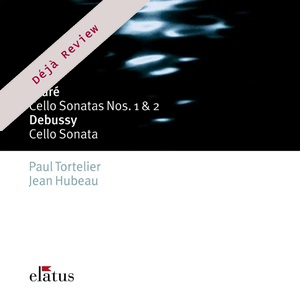
Déjà Review: this review was first published in January 2003 and the recording is still available.
Gabriel Fauré (1845-1924)
Cello Sonata No 1, Op 109 (1917)
Cello Sonata No 2, Op 117 (1921)
Elégie, Op 24 (1880)
Claude Debussy (1862-1918)
Cello Sonata (1915)
Paul Tortelier (cello), Jean Hubeau (piano)
rec. 1962, location unknown
Elatus 0927 490122 [55]
On a date which must have been only a few years after the making of this disc, I was an impressionable schoolboy sitting literally at the great man’s feet (first or second row with the stage towering above me). It was at a recital in what was then called Ashford High School (Kent) which included one of the Fauré sonatas. Performers of this calibre didn’t often come to Ashford and I was quite mesmerised. Tortelier was one of those performers you really have to see to get the full force of his magnetic personality; his whole body seemed to communicate his love of the music and his desire to get it across to the public. Before the performance he delighted us with a little speech in his rapid, voluble and very French-sounding English in which he showed us (with the pianist Geoffrey Pratley’s help) how Fauré used the “Tristan-chord” during the sonata.
While some performers in the “you really have to see them” category can disappoint when heard cold on disc, records show that Tortelier’s communicative abilities were grounded on a perfect technique and a very high level of musicianship. His passionate commitment emerges from the loudspeakers just as clearly as it did in the concert hall. With Jean Hubeau a fine partner it would be impossible to imagine finer performances of this music.
Late Fauré can seem austere beside his younger self (the much earlier Elégie obviously comes from the same delicately perfumed plant as “Après un rêve”) but in Tortelier’s hands these sonatas emerge glowing with humanity. If we remember how some of Debussy’s first piano pieces inhabit much the same world as Fauré’s, we can only marvel at how far apart the two had travelled by the time of their late cello sonatas. Tortelier is master of the wide range of moods which Debussy’s pithy little masterpiece encompasses, from infinite sadness to fierce exultation, and again reveals the humanity of a work which can seem more elusive in other hands.
The only information we get about this recording is that it was published by Erato in 1962; the Fauré pieces were issued in Great Britain by World Record Club in 1967. Though it obviously hasn’t quite the bloom of the best 2002 products, it is really very good indeed for its age. The booklet has a good note in three languages. An indispensable disc.
Christopher Howell
Buying this recording via a link below generates revenue for MWI and helps us keep free access to the site



















